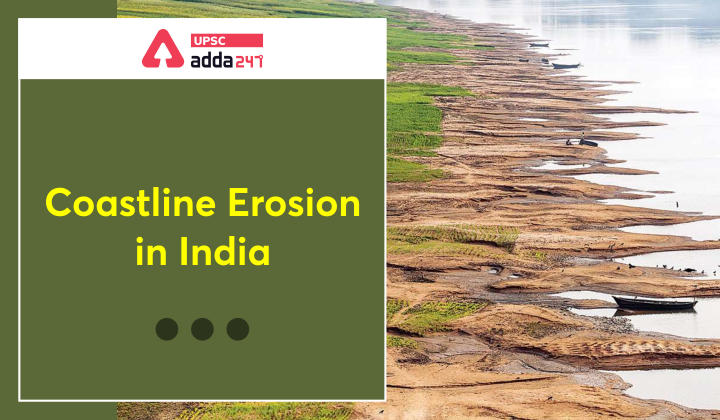Table of Contents
Relevance
- GS 3: Geographical features and their location-changes in critical geographical and the effects of such change.
Context
- National Centre for Coastal Research (NCCR) under the Union Ministry of Earth Sciences has released a new report where it has stated the worrying picture of Indian coastline.
Key points
- 32 per cent of India’s coastline underwent sea erosion and 27 per cent of it expanded between 1990 and 2018.
-
Coastal erosion
- The West Bengal coastline has undergone the maximum erosion (60 percent) followed by Puducherry (56 per cent); Kerala (41 per cent); Tamil Nadu (41 per cent); Andhra Pradesh (28 per cent); Gujarat including Daman and Diu (26 per cent); Odisha (26 per cent); Karnataka (24 per cent); Maharashtra (22 per cent); and Goa (19 per cent).
 Get free video for UPSC CSE preparation and make your dream of becoming an IAS/IPS/IRS a reality
Get free video for UPSC CSE preparation and make your dream of becoming an IAS/IPS/IRS a reality
-
Coastal expansion
- While on the other hand, Odisha coast expanded by 51 per cent, followed by the coast of Andhra Pradesh, which expanded 48 per cent; Karnataka (26 per cent); West Bengal (25 per cent); Tamil Nadu (22 per cent); Kerala (21 per cent); Gujarat including Daman and Diu (20 per cent); Goa (14 per cent; Maharashtra (10 per cent) and Puducherry (8 per cent).
-
India’s coastline
- The country’s coastline is around 6,630 km long where approx. 2,135 kilometres was subject to varying degrees of erosion and around 1,760 km expanded during this period.
- Only around 2,700 km of the coastline is stable.
-
Coastal pockets
- As many as 98 coastal pockets of the country have been facing sea erosion.
- Tamil Nadu has 26 coastal areas vulnerable to sea erosion, followed by West Bengal (16); Kerala (12); Maharashtra (8); Gujarat including Daman and Diu (8); Karnataka (7); Andhra Pradesh (6); Odisha (5); Goa (3) and Puducherry (3).
-
Effects on the local communities
- Some stretches of India’s shoreline are subject to varying degrees of erosion due to natural causes or anthropogenic activities.
- The coastal erosion does impact coastal communities residing in the erosion prone areas, including fishermen.
Tightening the Net Report: Net Zero Carbon Targets



 TSPSC Group 1 Question Paper 2024, Downl...
TSPSC Group 1 Question Paper 2024, Downl...
 TSPSC Group 1 Answer key 2024 Out, Downl...
TSPSC Group 1 Answer key 2024 Out, Downl...
 UPSC Prelims 2024 Question Paper, Downlo...
UPSC Prelims 2024 Question Paper, Downlo...







